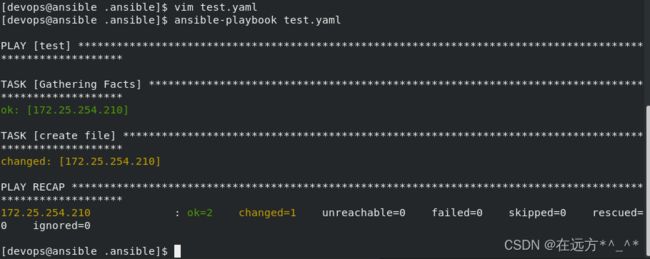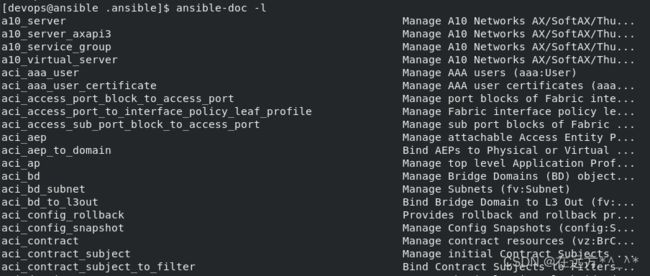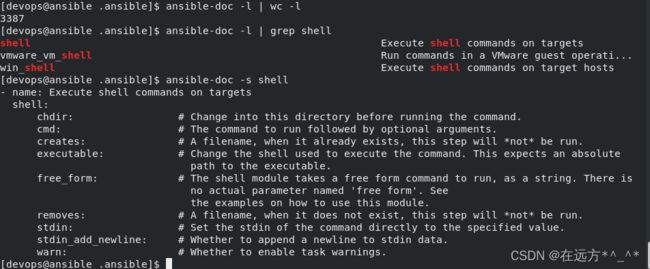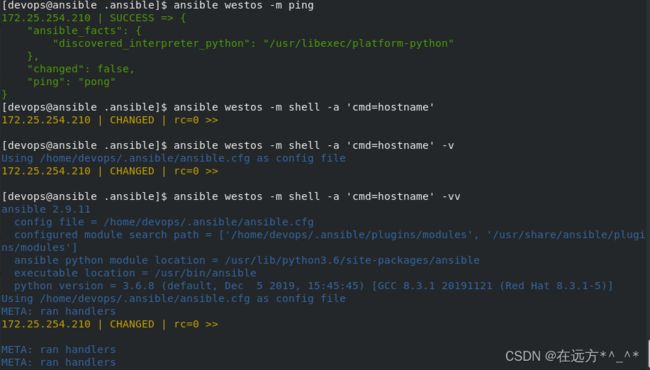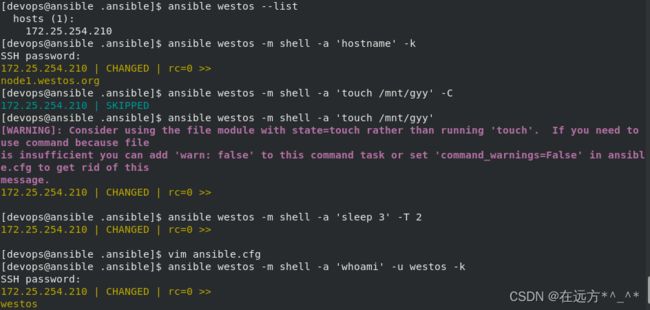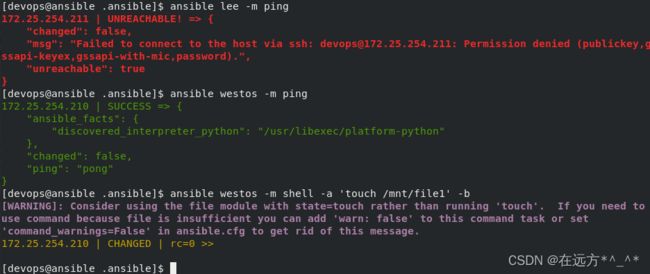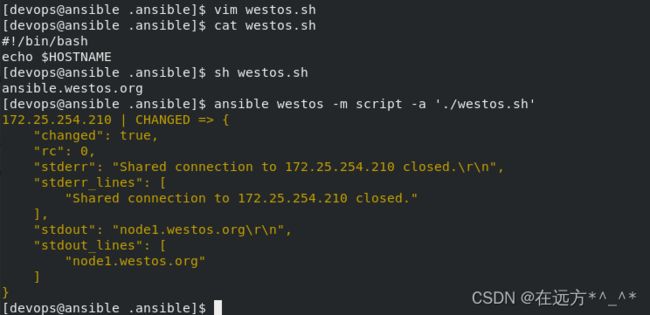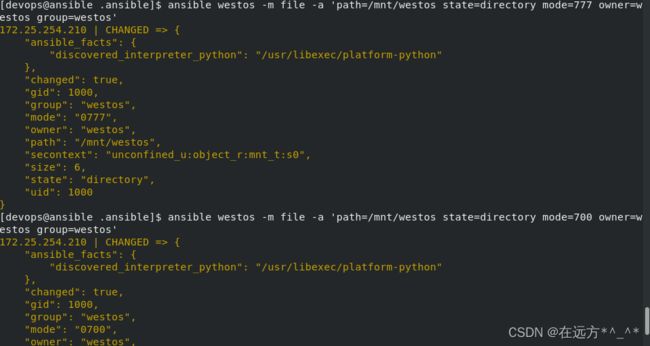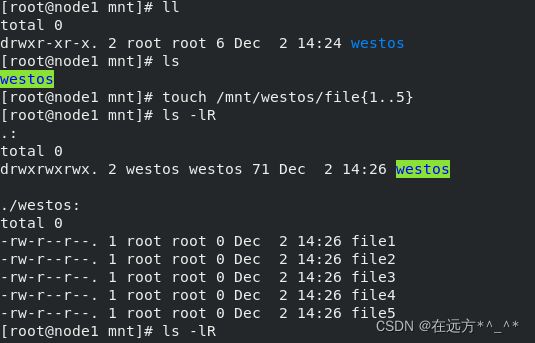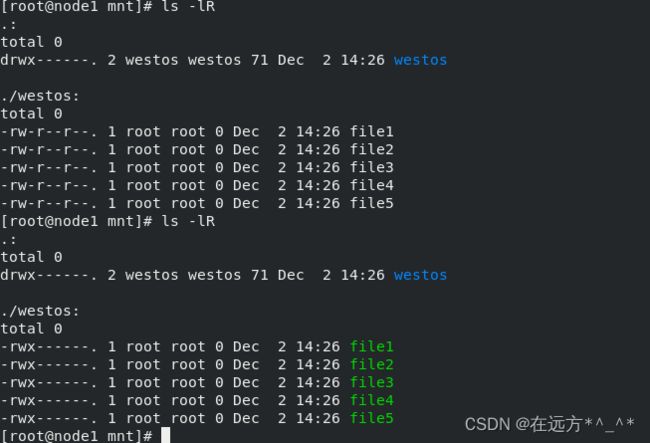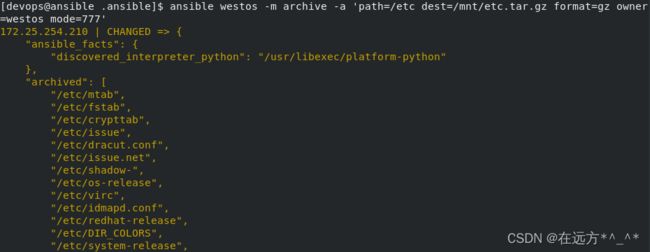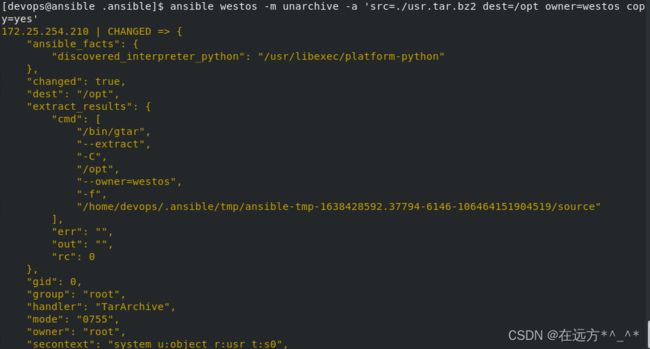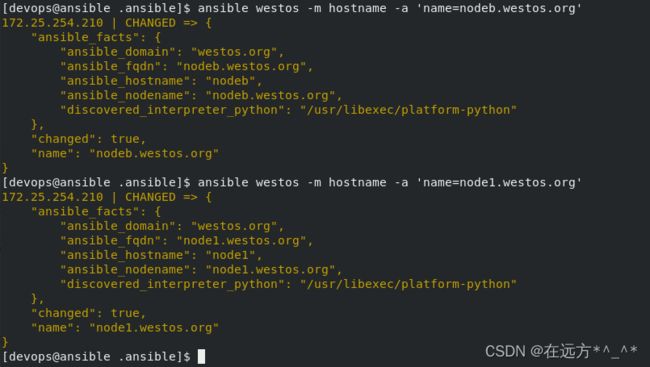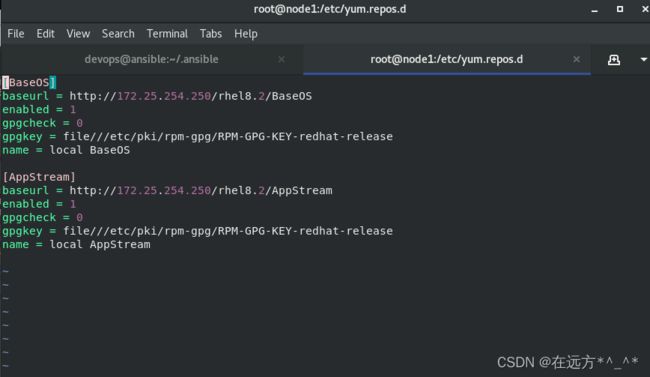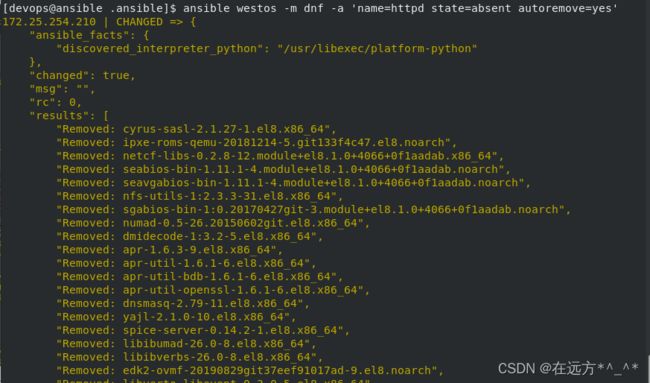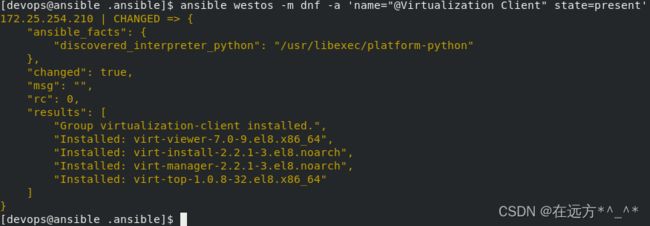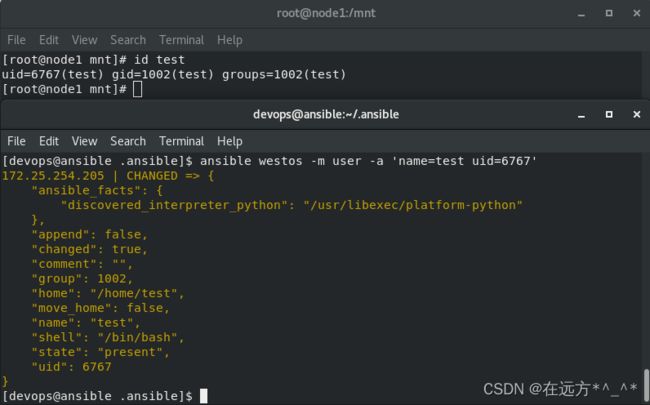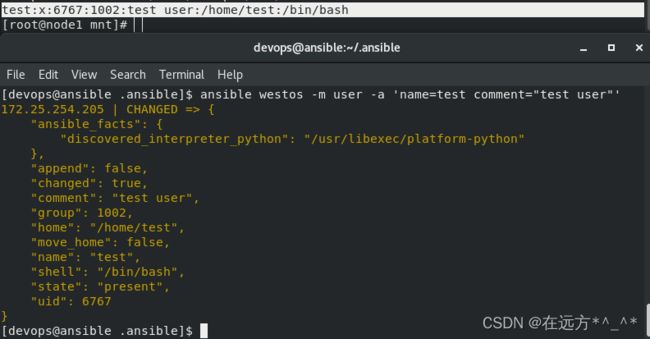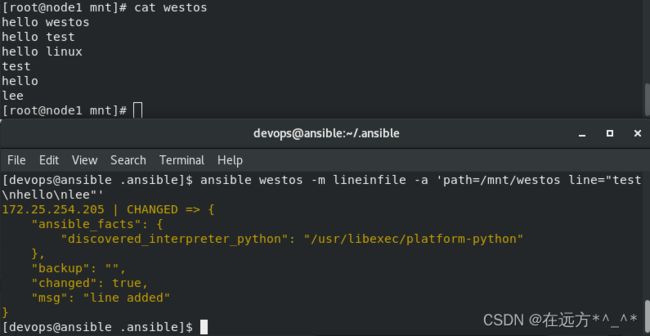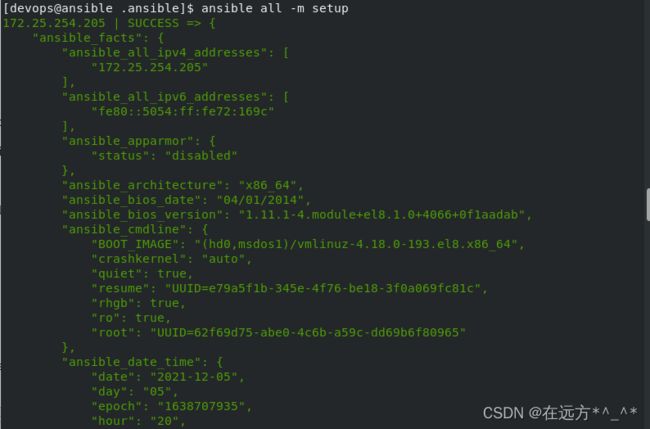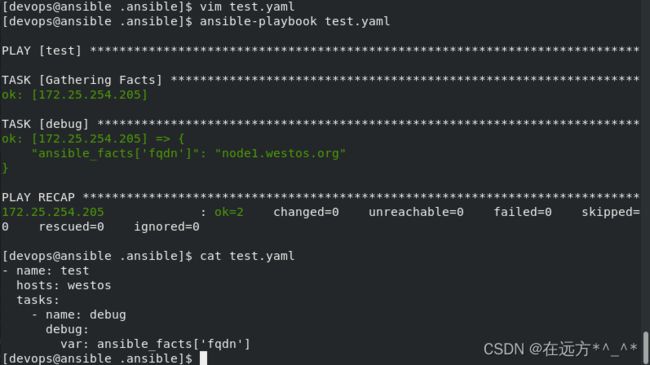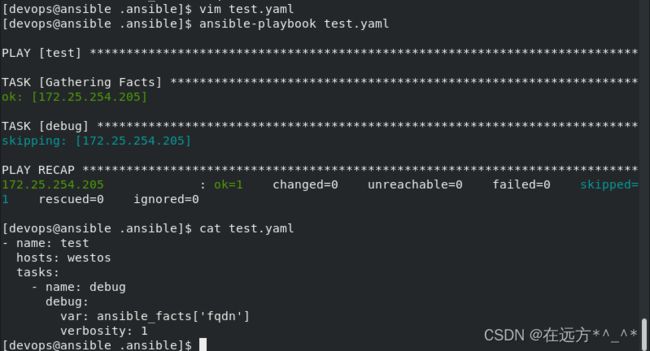Ansible 第二章 ansible中常用的模块
一.ansible实现管理的方式
Ad-Hoc ##利用ansible命令直接完成管理,主要用于临时命令使用场景
playbook ##ansible脚本,主要用于大型项目场景,需要前期的规划
[devops@ansible .ansible]$ vim test.yml
[devops@ansible .ansible]$ cat test.yml
- name: test
hosts: westos
tasks:
- name: check hostname
shell:
hostname
[devops@ansible .ansible]$ ansible-playbook test.yml
[devops@ansible .ansible]$ ansible-playbook test.yml -v ##详细过程 -vv -vvv更详细过程二.Ad-Hoc执行方式中如何获得帮助
ansible-doc ##显示模块帮助的指令
格式:
ansible-doc [参数] [模块...]
常用参数:
-l ##列出可用模块
-s ##显示指定模块的playbook片段
三.ansible命令运行方式及常用参数
格式:
ansible 清单 -m 模块 -a 模块参数
常用参数:
--version ##显示版本
-m module ##指定模块,默认为command模块
-v ##详细过程 -vv -vvv更详细过程
--list ##显示主机列表,也可以用--list-hosts
-k ##提示输入ssh连接密码,默认key认证
-C ##预执行检测
-T ##执行命令的超时时间,默认10s
-u ##指定远程执行的用户
-b ##执行sudo切换身份操作
-become-user=USERNAME ##指定sudo的用户-K ##提示输入sudo密码
[devops@ansible .ansible]$ vim ansible.cfg ##将第8行注释
1 [defaults]
2 inventory = ~/.ansible/inventory
3 host_key_checking = False
4 remote_user = devops
5 module_name = shell
6
7 [privilege_escalation]
8# become=True
9 become_method=sudo
10 become_user=root
11 become_ask_pass=False
-u ##指定远程执行的用户
-b ##执行sudo切换身份操作.
--become-user=root ##指定sudo的用户
-K ##提示输入sudo密码
[devops@ansible .ansible]$ vim ansible.cfg ##去掉第8行注释
四.ansible的基本颜色代表信息
绿色 ##执行成功但为对远程主机做任何改变
黄色 ##执行成功并对远程主机做改变
红色 ##执行失败
五.ansible中的常用模块
1.command
功能: 在远程主机执行命令,此模块为默认模块
常用参数:
| chdir | ##执行命令前先进入到指定目录 |
| cmd | ##运行命令指定 |
| creates | ##如果文件存在将不运行 |
| removes | ##如果文件存在在将运行 |
| free_form | ##在远程主机中执行的命令,此参数不需要加 |
在受控主机中查看:
2.shell
功能:shell和command功能类似
常用参数:
| chdir | ##执行命令前先进入到指定目录 |
| cmd | ##运行命令指定 |
| creates | ##如果文件存在将不运行 |
| removes | ##如果文件存在在将运行 |
| free_form | ##在远程主机中执行的命令,此参数不需要加 |
| executable | ##指定执行环境,默认为sh |
在受控主机中查看:
executable ##指定执行环境,默认为sh
3.script
功能: 在ansible主机中写好的脚本在受控主机中执行
[devops@ansible .ansible]$ vim westos.sh
#!/bin/bash
echo $HOSTNAME
[devops@ansible .ansible]$ sh westos.sh
[devops@ansible .ansible]$ ansible westos -m script -a './westos.sh'4.copy
功能:从ansible主机复制文件到受控主机
常用参数:
| src | ##源文件 |
| dest | ##目的地文件 |
| owner | ##指定目的地文件所有人 |
| group | ##指定目的地文件所有组 |
| mode | ##指定目的地文件权限 |
| backup=yes | ##当受控主机中存在文件时备份原文件 |
| content | ##指定文本内容直接在受控主机中生成文件 |
ansible westos -m copy -a 'src=./westos.sh dest=/mnt/westos'
ansible westos -m copy -a 'src=./westos.sh dest=/mnt/westos mode=700'
ansible westos -m copy -a 'src=./westos.sh dest=/mnt/westos mode=700 group=westos owner=westos' backup=yes ##当受控主机中存在文件时备份原文件
content ##指定文本内容直接在受控主机中生成文件
ansible westos -m copy -a 'content="hello westos" dest=/mnt/westos backup=yes' 在受控主机中查看:
5.fetch
功能:从受控主机把文件复制到ansible主机,但不支持目录
常用参数:
| src | 受控主机的源文件 |
| dest | 本机目录 |
| flat | 基本名称功能 |
[root@node1 mnt]# rm -fr *
[root@node1 mnt]# echo $HOSTNAME > westos
[root@node1 mnt]# ls
westos
[root@node1 mnt]# cat westos
node1.westos.org[devops@ansible .ansible]$ ansible westos -m fetch -a 'src=/mnt/westos dest=/tmp'
[devops@ansible .ansible]$ ls /tmp
[devops@ansible .ansible]$ cat /tmp/172.25.254.210/mnt/westos
[devops@ansible .ansible]$ ansible westos -m fetch -a 'src=/mnt/westos dest=/tmp/gyy flat=yes'
[devops@ansible .ansible]$ cat /tmp/gyy
6.file
功能:设置文件的属性
常用参数:
| path | 指定文件名称 |
| state | 指定操作状态 touch ##建立 hard |
| mode | 设定权限 |
| owner | 设定文件用户 |
| group | 设定文件组 |
| src | 源文件 |
| dest | 目标文件 |
| recurse=yes | 递归更改 |
实例:
ansible westos -m file -a 'path=/mnt/westos state=touch'
ansible westos -m file -a 'path=/mnt/westos state=absent'
ansible westos -m file -a 'path=/mnt/westos state=directory'
ansible westos -m file -a 'path=/mnt/westos state=absent' ##absent 可以删除目录/删除文件
ansible westos -m file -a 'path=/mnt/westos state=directory mode=777 owner=westos group=westos'
ansible westos -m file -a 'path=/mnt/westos state=directory mode=700 owner=westos group=westos' ##只修改了目录本身的权限
ansible westos -m file -a 'path=/mnt/westos state=directory mode=700 recurse=yes'
mode ##设定权限
owner ##设定文件用户
group ##设定文件组
recurse=yes ##递归更改
在受控主机中查看:
7.archive
作用:压缩
常用参数 :
| path | 打包目录名称 |
| dest | 声称打包文件名称 |
| format | 打包格式 |
| owner | 指定文件所属人 |
| mode | 指定文件权限 |
实例:
ansible westos -m archive -a 'path=/etc dest=/mnt/etc.tar.gz format=gz owner=westos mode=777'
在受控主机中查看:
[root@node1 mnt]# ls
etc.tar.gz westos
8.unarchive
功能:解压缩
| copy | 默认为yes 从ansible主机复制文件到受控主机,设定为no 从受控主机中寻找src源文件 |
| remote_src | 功能同copy且相反,设定为yes 表示包在受控主机 设定为no表示包在ansible主机 |
| src | 包路径,可以使ansible主机也可以使受控主机 |
| dest | 受控主机目录 |
| mode | 加压后文件权限 |
实例:
tar jcf usr.tar.bz2 /usr/bin/
ansible westos -m unarchive -a 'src=./usr.tar.bz2 dest=/opt owner=westos copy=yes' ##copy=yes,从ansible主机解压文件到受控主机
ansible westos -m file -a 'path=/opt/usr state=absent' ##删除受控主机中之前解压的文件
ansible westos -m unarchive -a 'src=/mnt/etc.tar.gz dest=/opt owner=westos remote_src=yes'##从受控机解压文件到受控主机9.hostname
作用:管理主机名称
常用参数:
name ##指定主机名称
实例:ansible westos -m hostname -a 'name=nodeb.westos.org'
ansible westos -m hostname -a 'name=node1.westos.org'
在受控主机中查看:
10. cron
作用:计划任务
常用参数:
minute ##分钟
hour ##小时
day ##天
month ##月
weekday ##周
name ##任务名称
job ##任务脚本或命令
disabled ##yes 禁用计划任务
##no 启动计划任务state ##absent 删除计划任务
实例:
ansible westos -m cron -a 'job="touch /mnt/westosfile" name=test minute=21 hour=15'
ansible westos -m cron -a 'job="touch /mnt/westosfile" name=test minute=*/2 hour=15' ##每两秒执行一次
ansible westos -m cron -a 'job="touch /mnt/westosfile" name=test disabled=yes' ##yes 禁用计划任务
ansible westos -m cron -a 'job="touch /mnt/westosfile" name=test disabled=no' ##no 启动计划任务
ansible westos -m cron -a 'job="touch /mnt/westosfile" name=test state=absent' ##absent 删除计划任务在受控主机中查看:
![]()
11.yum_repository
作用:配置系统软件仓库源文件
| 常用参数: | |
| name baseurl |
指定仓库名称 |
实例:
ansible westos -m file -a 'path=/etc/yum.repos.d/westos.repo state=absent' ##先删除之前配置的软件仓库
ansible westos -m yum_repository -a 'file=westos name=AppStream description="local AppStream" baseurl=http://172.25.254.250/rhel8.2/AppStream gpgcheck=no enabled=yes gpgkey=file///etc/pki/rpm-gpg/RPM-GPG-KEY-redhat-release'ansible westos -m yum_repository -a 'file=westos name=BaseOS description="local BaseOS" baseurl=http://172.25.254.250/rhel8.2/BaseOS gpgcheck=no enabled=yes gpgkey=file///etc/pki/rpm-gpg/RPM-GPG-KEY-redhat-release'
ansible westos -m yum_repository -a 'file=westos name=BOS description="local BOS" baseurl=http://172.25.254.250/rhel8.2/BOS gpgcheck=no enabled=yes gpgkey=file///etc/pki/rpm-gpg/RPM-GPG-KEY-redhat-release' ##注意:错误的也可以写进去
ansible westos -m yum_repository -a 'file=westos name=BOS state=absent' ##删除12.dnf
作用:管理系统中的dnf仓库及管理软件
常用参数:
name ##指定包
state ##指定动作
#present 安装
#latest 更新
#absent 删除
list ##列出指定信息
# httpd
# installed
# all
# available
disable_gpg_check ##禁用gpgkey检测
enablerepo ##指定安装包来源
disablerepo ##禁用安装包来源
ansible westos -m dnf -a 'name=httpd state=present' ##present 安装
ansible westos -m dnf -a 'name=httpd state=absent' ##absent 删除
ansible westos -m dnf -a 'name=httpd state=latest' ##latest 更新
ansible westos -m dnf -a 'name=httpd state=absent autoremove=yes' ##全部删除
ansible westos -m dnf -a 'name=httpd state=present'
ansible westos -m dnf -a 'name=httpd state=absent autoremove=no' ##默认为no,只删除包和依赖ansible westos -m dnf -a 'name=httpd state=latest enablerepo=AppStream' ##enablerepo 指定安装包来源
ansible westos -m dnf -a 'name=https://dl.fedoraproject.org/pub/epel/epel-release-latest-8.noarch.rpm state=present' ##从网络安装epel源
ansible westos -m dnf -a 'name=epel-release state=absent' ##删除epel源
给受控机联网:
从网络下载epel源:
dnf group list
dnf group list --hidden
ansible westos -m dnf -a 'name="@Virtualization Client" state=present'
13.service
作用:管理系统服务状态
常用参数:
name ##指定服务名称
state ##指定对服务的动作
#started
#stoped
#restarted
#reloaded
enabled ##设定服务开机是否启动
#yes开启启动
#no开机不启动
实例:
[devops@ansible .ansible]$ ansible westos -m dnf -a 'name=httpd state=latest enablerepo=AppStream'
[devops@ansible .ansible]$ ansible westos -m service -a 'name=httpd state=started enabled=yes'
14.firewalld
常用参数:
zone ##火墙的域
service ##服务名称
permanent ##永久生效
state
enabled ##允许
disabled ##拒绝
immediate ##立即生效
[devops@ansible .ansible]$ ansible westos -m firewalld -a 'zone=public service=http permanent=yes state=enabled immediate=yes' ##火墙允许Apache通过,并且永久生效,immediate表示立即生效
[devops@ansible .ansible]$ ansible westos -m firewalld -a 'zone=public service=http permanent=yes state=disabled immediate=yes'
15.user
作用:模块可以帮助我们管理远程主机上的用户,比如创建用户、修改用户、删除用户、为用户创建密钥对等操作。
常用参数:
| name | 必须参数,用于指定要操作的用户名称 |
| group | 指定用户所在的基本组 |
| groups | 指定用户所在的附加组 |
| append | 指定添加附加组默认值为no |
| shell | 指定用户的默认 shell |
| uid | 指定用户的 uid 号 |
| comment | 指定用户的注释信息 |
| state | 用于指定用户是否存在于远程主机 present 建立 absent 删除 |
| remove | 当删除用户是删除用户家目录,默认值为no |
| password | 此参数用于指定用户的密码。但密码为明文 可以用openssl password -6 '密码'生成加密字符 |
| generate_ssh_key | 生成sshkey |
[devops@ansible .ansible]$ ansible westos -m user -a 'name=test'
[devops@ansible .ansible]$ ansible westos -m user -a 'name=test uid=6767'
[devops@ansible .ansible]$ ansible westos -m user -a 'name=test group=westos'
[devops@ansible .ansible]$ ansible westos -m user -a 'name=test group=test'
[devops@ansible .ansible]$ ansible westos -m user -a 'name=test group=72'
[devops@ansible .ansible]$ ansible westos -m user -a 'name=test group=westos append=yes'
[devops@ansible .ansible]$ ansible westos -m user -a 'name=test comment="test user"' ##指定用户的注释信息
[devops@ansible .ansible]$ openssl passwd -6
Password:
Verifying - Password:
$6$JZbY2oHSi7ht12F4$GHNLmWhItFLC7lGqROQUsfvxasawwpvEQWS/ezR.EKqsinz5Xog5MPJw/KxYYQnmJgkK8XGgl3nOt6oHoCd8h1
[devops@ansible .ansible]$ ansible westos -m user -a "name=test password='\$6\$JZbY2oHSi7ht12F4\$GHNLmWhItFLC7lGqROQUsfvxasawwpvEQWS/ezR.EKqsinz5Xog5MPJw/KxYYQnmJgkK8XGgl3nOt6oHoCd8h1'"
[devops@ansible .ansible]$ ansible westos -m user -a 'name=test generate_ssh_key=yes'
[devops@ansible .ansible]$ ansible westos -m user -a 'name=test state=absent' ##删除用户16.group
作用:group 模块可以帮助我们管理远程主机上的组。
常用参数:
| name | 用于指定要操作的组名称 |
| state | 用于指定组的状态 present 建立 absent 删除 |
| gid | 用于指定组的gid |
实例:
[devops@ansible .ansible]$ ansible westos -m group -a 'name=test'
[devops@ansible .ansible]$ ansible westos -m group -a 'name=test gid=6666'
[devops@ansible .ansible]$ ansible westos -m group -a 'name=test state=absent' ##删除组
[root@node1 ~]# cat /etc/group ##在受控主机中查看组17.lineinfile
| path | 指定要操作的文件 |
| line | 指定文本内容。 "|+" 表示格式化输入 |
| regexp | 用正则表达式匹配对应的行当替换文本时 如果有多行文本都能被匹配 则只有最后面被匹配到的那行文本才会被替换 当删除文本时,如果有多行文本都能被匹配 |
| state | 当想要删除对应的文本时需要将state参数的值设置为absent state的默认值为present。 |
| backrefs | 当内容无匹配规则时不对文件做任何更改,默认值为no 向后引用regexp变量信息 |
| insertafter | 借助insertafter参数可以将文本插入到“指定的行”之后 nsertafter参数的值可以设置为EOF或者正则表达式 |
| insertbefore | 借助insertbefore参数可以将文本插入到“指定的行”之前 insertbefore参数的值可以设置为BOF或者正则表达式 |
| backup | 是否在修改文件之前对文件进行备份 |
| create | 当要操作的文件并不存在时,是否创建对应的文件 |
[devops@ansible .ansible]$ ansible westos -m copy -a 'content="hello westos\nhello test\nhello linux" dest=/mnt/westos' ##\n换行
[root@node1 mnt]# cp westos westos1
[devops@ansible .ansible]$ ansible westos -m lineinfile -a 'path=/mnt/westos regexp="^hello" line="hello westos"' ##如果有多行文本都能被匹配,则只有最后面被匹配到的那行文本才会被替换
[root@node1 mnt]# cat westos ##只有最后一行文本被替换
hello westos
hello test
hello westos
[devops@ansible .ansible]$ ansible westos -m lineinfile -a 'path=/mnt/westos regexp="^hello" state=absent'
[root@node1 mnt]# cat westos
[devops@ansible .ansible]$ ansible westos -m lineinfile -a 'path=/mnt/westos regexp="test" line="westos lee"'
[root@node1 mnt]# cat westos
hello westos
westos lee
hello linux
[devops@ansible .ansible]$ ansible westos -m lineinfile -a 'path=/mnt/westos regexp="(h.{4}.*(w.{5}))" line="\1"'
[root@node1 mnt]# cat westos
\1
westos lee
hello linux
[devops@ansible .ansible]$ ansible westos -m lineinfile -a 'path=/mnt/westos regexp="(h.{4}).*(w.{5})" line="\1" backrefs=yes'
[root@node1 mnt]# cat westos
hello
hello test
hello linux
[devops@ansible .ansible]$ ansible westos -m lineinfile -a 'path=/mnt/westos line="######ok#######"'
[root@node1 mnt]# cat westos
hello westos
hello test
hello linux
######ok#######
[devops@ansible .ansible]$ ansible westos -m lineinfile -a 'path=/mnt/westos line="######ok#######" insertbefore="BOF"'
[root@node1 mnt]# cat westos
######ok#######
hello westos
hello test
hello linux
[devops@ansible .ansible]$ ansible westos -m lineinfile -a 'path=/mnt/westos line="######ok#######" insertafter="test"'
[root@node1 mnt]# cat westos
hello westos
hello test
######ok#######
[devops@ansible .ansible]$ ansible westos -m lineinfile -a 'path=/mnt/westos line="######ok#######" insertbefore="hello"'
[root@node1 mnt]# cat westos
hello westos
hello test
######ok#######
hello linux[devops@ansible .ansible]$ ansible westos -m lineinfile -a 'path=/mnt/westos line="test\hello\lee"'
[root@node1 mnt]# cat westos
hello westos
hello test
hello linux
test\hello\lee
[devops@ansible .ansible]$ ansible westos -m lineinfile -a 'path=/mnt/westos line="test\nhello\nlee"' ##\n换行
[root@node1 mnt]# cat westos
hello westos
hello test
hello linux
test
hello
lee
[devops@ansible .ansible]$ vim test.yml
- name: test
hosts: westos
tasks:
- lineinfile:
path: /mnt/westos
line: |+
123
234
237
[devops@ansible .ansible]$ ansible-playbook test.yml
[root@node1 mnt]# cat westos
hello westos
hello test
hello linux
test\hello\lee
test
hello
lee
123
234
23718.replace
replace
作用:replace 模块可以根据我们指定的正则表达式替换文件中的字符串,文件中所有被匹配到的字符串都会被替换。
常用参数:
| path | 指定要操作的文件 |
| regexp | 指定一个正则表达式 文件中与正则匹配的字符串将会被替换 |
| replace | 指定最终要替换成的字符串 |
| backup | 是否在修改文件之前对文件进行备份,最好设置为yes |
[devops@ansible .ansible]$ ansible westos -m replace -a 'path=/mnt/westos regexp="hello" replace="lee" backup=yes'
[root@node1 mnt]# cat westos ##将hello替换为lee
19.setup
功能
setup模块用于收集远程主机的一些基本信息
常用参数
filter ##用于进行条件过滤。如果设置,仅返回匹配过滤条件的信息
[devops@ansible .ansible]$ ansible all -m setup
[devops@ansible .ansible]$ ansible westos -m setup -a 'filter="ansible_fqdn"'20.debug
功能:
调试模块,用于在调试中输出信息
| msg | 调试输出的消息 |
| var | 将某个任务执行的输出作为变量传递给debug模块 debug会直接将其打印输出 |
| verbosity | debug的级别(默认是0级,全部显示) |
[devops@ansible .ansible]$ ansible westos -m debug -a 'msg=hello'
172.25.254.205 | SUCCESS => {
"msg": "hello"
}
[devops@ansible .ansible]$ ansible westos -m debug -a 'var=hello'
172.25.254.205 | SUCCESS => {
"hello": "VARIABLE IS NOT DEFINED!"
}
[devops@ansible .ansible]$ vim test.yaml
- name: test
hosts: westos
tasks:
- name: debug
debug:
var: ansible_facts['fqdn']
[devops@ansible .ansible]$ ansible-playbook test.yaml
[devops@ansible .ansible]$ vim test.yaml
- name: test
hosts: westos
tasks:
- name: debug
debug:
var: ansible_facts['fqdn']
verbosity: 1
[devops@ansible .ansible]$ ansible-playbook test.yaml
